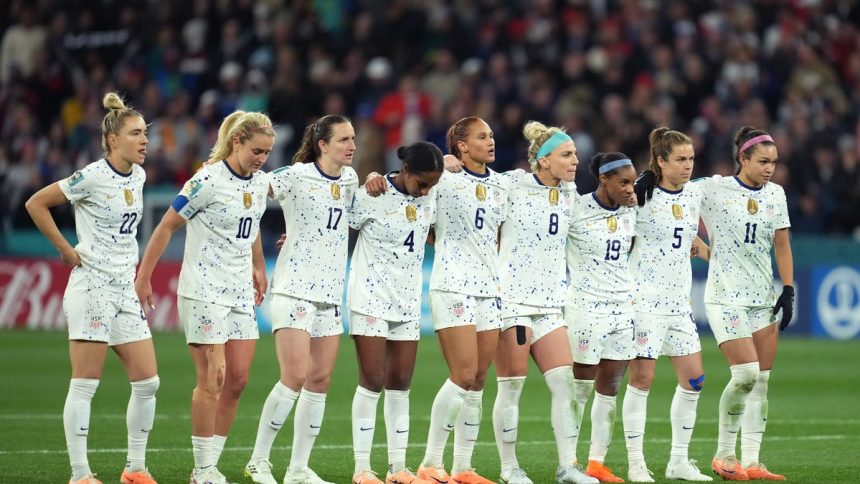The symbolism of the final moment can’t be shoved off. The USWNT’s Alyssa Naeher can’t do much more to keep the final penalty out. But sometimes…the bear eats you.
While it likely will be buried in a discussion of the USWNT’s whole tournament, their exit hinged on the slimmest of distances. A millimeter. Because the US played well. They were certainly the better team. All the things fans and observers had been screaming for them to change in the group stage, or for the previous three years really, they did. They reformed the midfield, flipping the triangle to a double-pivot. They actually played through it with the ball. They freed up Lindsey Horan into a #10 instead of someone who had to put out every fire, also attack, and also be an auxiliary right winger. They switched the field to free up their wingers. They defended very well. They were secure on set pieces. They were varied, not just shoveling the ball down their left side and telling Sophia Smith, “Just do shit.” There’s not much more they could have done, but sometimes you just lose.
Finishing has been an issue for the US of late against quality opposition. The stats will tell you they created more than enough against Portugal and Sweden (2.9 xG against the former 1.9 post-shot xG against Sweden). But even that seems on the harsh side. The truth is probably closer to the fact that as the gap the USWNT had on the rest of the world has closed, that means more opponents have more world class players who can undo all the good work and planning simply by being awesome. Sweden have one in goal, Zecira Musovic, or at least one that can play like it. That’s the difference between the US going through and going home. On another day, against a different keeper not channeling Gandalf against the Balrog, Horan’s cracker from just outside the penalty spot early in the second half nearly tears the net off the posts, the US leads 1-0, and a pretty punchless Sweden fails to register a comeback. The US was inches from that, too.
A lot will be made of the near faceplant the US pulled off in the group stage as the culprit, and that has its validity. But some of that is also just the vagary of a World Cup draw. Had that gone differently, finishing second in the group could have landed the US Switzerland. How’d that look? Or an exciting but still inexperienced Colombia. Still, fuck around in the group stage as the US did, and a team might just find out in the next round.
A loss on penalties is the most frustrating, heartbreaking way to beef it, given the margins inherent to it. This one will be more so for USWNT fans, those that wanted this tournament to be a direction change for the whole program and for those who just wanted to see them win again. The macro view of this tournament maybe alters with their much improved performance, the micro probably doesn’t.
The micro is that, given that the World Cup is every four years, sometimes you come to the peak of that cycle and your team just doesn’t have everything it needs. Be it injuries or loss of form or simply the randomness of how national teams come together, tournament time can roll around and a coach finds that they’re weak at fullback or there’s an injury they just can’t overcome or crucial players from the past just got old and younger players to take over either aren’t there or aren’t quite ready. And this isn’t a club team. A national team can’t buy players or make trades. The player pool is the player pool.
And this edition of the USWNT just came up light in midfield. Julie Ertz’s two-plus year absence was a machete to how the team used to work. Sam Mewis’s likely career-ending injury another. And there hasn’t been anyone else to step up to fill those gaps really. Andi Sullivan was much improved against Sweden with the addition of Emily Sonnett next to her and not being asked to be an entire midfield onto herself, but here’s a pretty solid highlight package of what that’s looked like both in the lead-up to this tournament and in the group stage:
And that’s been the problem for the US since their last World Cup. It’s never been solved, and one solid 120 minutes in a valiant loss doesn’t really wipe away how both Netherlands and Portugal made that glaringly obvious.
Vlatko Andonovski is not the coach for this team
Certainly this team wasn’t helped by its coach, and Vlatko Andonovski is certainly going to be unemployed next week. The omission of Sam Coffey, who only pulls the strings from deep midfield for the NWSL’s best team the past two seasons (Portland), looks even more baffling now. The tactics against the Dutch and Portuguese were even more so, with the US attempting to attack in a donut shape (Kim McCauley at The Athletic breaks it down excellently here) that was not only easy to defend but left a runway for teams to counter and attack through. The US didn’t do enough, at least until the Sweden game, to get the best out of its best players — Horan and Smith being the first two names on that list.
They lacked a plan in both defense and attack against Netherlands and Sweden, which is how they looked at the Olympics (an admittedly weird tournament played behind closed doors in a steambath) and how they’ve looked in the interim. When it became obvious against Portugal that the weren’t going to catch Netherlands on goal-difference, they should have just shut up shop and advanced. They were still attacking in injury time, pressing in a fractured manner, and that’s what nearly got them booted out then and there. It’s indicative of the lack of thought and planning from the dugout.
And some players just got old. Alex Morgan looked half-step off after the first game. Megan Rapinoe was consistently the first option off the bench, and was quite simply awful. Crystal Dunn lacked her familiar dynamism from fullback. Could Andonovski have opted for moving Smith in the middle earlier to give her some new looks? Morgan didn’t do much to warrant 350 minutes or so on the field. Ertz was good enough, but restrained out of position at centerback, and greatly benefited from Naomi Girma racing down the path to best central defender in the world next to her. It happens.
At the macro level, the way the US plays and how they develop players will probably get less scrutiny than if they’d gotten they’d gotten punted violently into the ocean instead of this way. It’s still worth a look. The USWNT has always been built on athleticism and urgency and physicality, but that route just isn’t going to be as fruitful in the future with the way teams are improving technically so quickly. Even if the US wanted to play like we’ve seen Japan or Spain or England play (at least against China but mostly last year), it’s doubtful they could.
Some of that is the NWSL, a very physical league built on directness in attack, and sometimes reffed more like a barroom brawl than soccer. It probably makes for a more watchable product, but it doesn’t really reward technical play. Players like Smith and Trinity Rodman and Lynn Williams and others are rewarded for being fast and playing in the straightest lines, but are unrehearsed at this level when something different is asked. That’s unlikely to change though, it’s how the American system sees the game.
Below that, it’s fair to ask, with the academy system growing in other parts of the world, whether the travel team/scholarship/draft route is really the best way. We know the problems with it and the amount of players who fall through simply due to financial status, and it’s less concerned with development than profit and winning at stages where players really just need to still learn. Here’s a good look at it from Henry Bushnell at Yahoo!.
All that said, the US will always arrive at a World Cup having formed a team from the largest player pool, which by definition will have had to produce an immensely talented squad. It will be a favorite until all of us are dead and maybe even beyond. One tournament result does not mean the US has lost its advantage, or really give us a clear idea of how much it’s shrank. We just know that it is shrinking, and on every level the USWNT has been slow to react. Even down to this tournament, where its manager was too slow to react to how the team was being played and beaten. He had three years. Getting it right in the final game only meant that they were still at the mercy of the finest margins.
Or maybe sometimes you just lose.
Follow Sam on Twitter @Felsgate and on Bluesky @Felsgate.bsky.social









